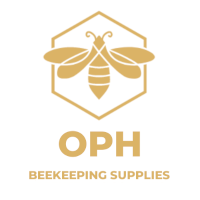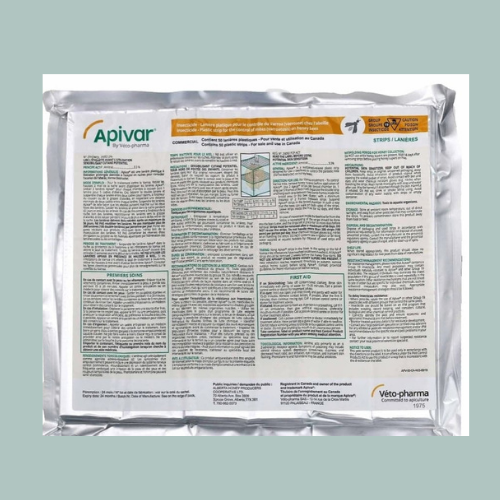FYI Beekeepers is Apivar becoming mite resistant? ! Small scale studies are suggesting that Apivar our go to mite treatment is losing efficacy. This has been suspected for the last couple of years but growing concern over last winters huge bee deaths have promoted more research into the matter.
We have told beekeepers in 2022 that have frequented our beekeeping supply store to make sure you don’t use one treatment over and over or more treatments will become mite resistant like Apistan & Checkmite. So far Apivar has not fallen as low as Apistan has. Apistan has fallen from 99% efficacy to 30% and Apivar has fallen slightly from 99% to 80% but in some instances it has been lower in some colonies so we need to keep a watchful eye on this. Keep changing your treatment methods. Two weeks after treatment completion check your mite counts again and see if you are within the 1% threshold amount for mites.
The other method we have stressed is the importance of knocking back those mites consistently. This means spring, summer and fall. If you are using organic treatments or natural treatments make sure you are testing and making sure the treatments are working. Have you checked your mite drops?
The spring 2022 winter losses have been attributed to ineffective varroa control or no varroa control, poor queens and weak colonies in the fall. I can’t tell you how many people I personally talked to last year who were unaware for the need to use varroa medication. I feel it is our responsibility to advise beekeepers especially new ones of the importance of treating for mites. I understand that we, as beekeepers , would like to use natural products rather than chemical based products however, if the natural products are ineffective and the bees die what is the point of that. I just think we need to keep changing the treatment methods we use and if it is natural methods be sure to check your mite drops after treatment to see if it has been effective.
The problem of poor queens is another matter. I think the practice of getting queens from other countries where they are used to a much hotter climate and warmer winters is not really a good idea. Instead I think we should concentrate our efforts on producing local queens who are used to our natural climate. The queens are flown by plane often for days and are already tired and worn out by the time it gets to the beekeeper. Some queens last year were dead on arrival and we really don’t know how well the breeding went either. Another reason to produce local queens. We are trying to produce more mite resistant bees and queens that fair well in our climate. We and many bee & queen producers alike think this is a much better idea. There was an incident last year where a beekeeper in Alaska I think ordered bee packages from another country as there bees do not survive their winters and the plane got sent to another airport and left to die in the sun. This is just heartbreaking when we are trying to save the bees from extinction.
The problem of weak colonies is mostly caused by mites weakening the bees especially going into wintertime. We need to ensure we keep those mite counts low at at times to keep the hive healthy and thriving especially in the fall. This is why we suggest formic pro in the summer when temperatures are under 85 degrees F for the first three days of treatment. In the summertime the mites really thrive because we haven’t been using mite treatments when the supers are on. Formic Pro is an organic treatment that is very effective and it doesn’t go in the honey so it is safe to use with honey supers on. Also, it does kill the mites under the brood cap as well. Due to the heat sometimes formic pro can be a bit hard on the bees so it is recommended instead of using two strips use one at a time and this makes it a bit easier on the bees. We also recommend that you use hive alive or honey B healthy to keep the bees healthy. It helps there digestive systems as well.
You can read the full article from Manitoba Cooperative here: https://www.manitobacooperator.ca/livestock/control-slipping-on-varroa-mites/?fbclid=IwAR1jqPthtlzyKBND0qs7OpVLPVx_u8Xz2WnzN__uPK240YPUg5_NXth3i1k
Is Apivar Becoming Mite Resistant? Time will tell I guess always check your mite drops after treatment and that should give you an indication if its still working as prescribed. Good luck!


